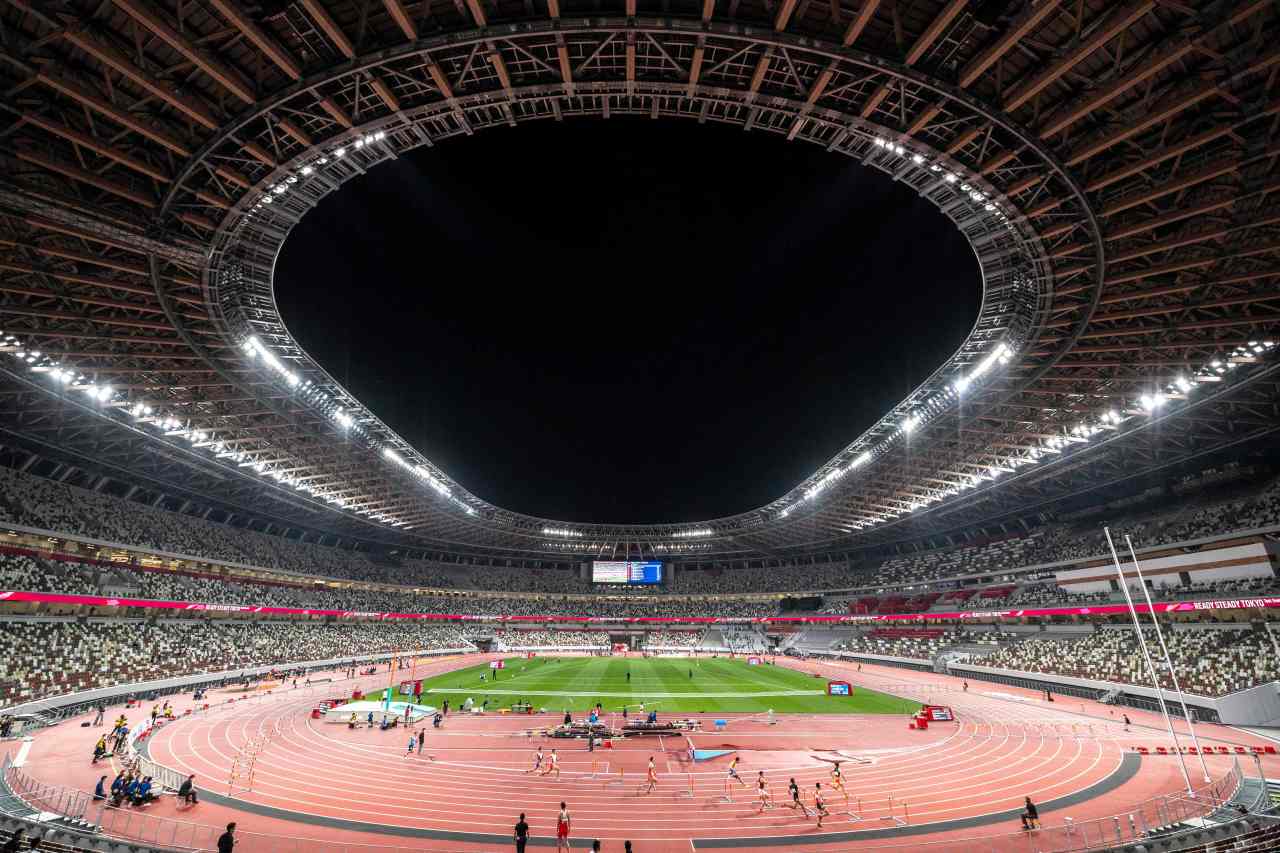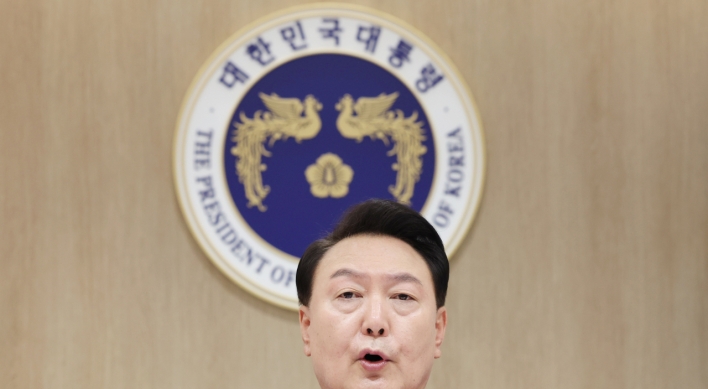Tokyo gives taste of what COVID era Olympic Games will be like
By BloombergPublished : May 9, 2021 - 21:06

The Tokyo Olympics went off without a hitch. That is, at least, at a test event at the city’s National Stadium in preparation for the main spectacle.
About 1,600 athletes, organizers and media got an early look Sunday at what the games will be like when they kick off on July 23. There was a full day of 100-meter heats, hammer throws and pole vaulting to make sure the Omega clocks, jumbo displays and robots on the field were working as they should.
A key focus, however, was how such a large-scale event can be pulled safely off in the middle of a pandemic. Already delayed once, the Tokyo Olympics will be one of the most unusual in the 125-year history of the modern games. While international athletes will come this summer, overseas spectators will not. Hotel rooms will mostly be empty, while restaurants and department stores won’t get a boost from the usual flood of visitors.
“It’s important to have this simulation so that we are prepared for any circumstance,” Seiko Hashimoto, Japan’s Olympics chief, said at a briefing Friday.
The National Stadium, designed by Japanese architect Kengo Kuma, is ready. Completed at the end of 2019, the 68,000-seat venue is in pristine condition. Thick wooden rafters hold up the roof, and the plants adorning the exterior have been properly watered. The concession stands weren’t open, and there was plenty of room to walk around and take in the space.
It’s a place that most people will only see on television. Although the white and green seats will be limited to those who obtain tickets in Japan, it’s not clear yet whether the number of spectators will be reduced further, or eliminated altogether, in order to prevent the spread of coronavirus infections during the 16 days of the quadrennial games.
Anti-infection protocols were, for the most part, normal. Media attendees on Sunday were required to track their temperatures and self-monitor health conditions for a week before, as well as after. Temperatures were checked again at the entrance, and face masks were mandatory.
Overseas attendees
“I’d never been more nervous in my life entering the stadium,” said Sarasa Tanaka, who competed in the women’s 100 meter sprint on Sunday. “But once I ran, I discovered it was easy to run. I want the games to go ahead.”
Hovering nearby was Yannis Nikolaou, senior communications manager for World Athletics, telling local staff to make sure there was more space in the athletes interview area to ensure that there will be at least 2 meters of separation between them, as well as from cameramen and journalists. The current setup didn’t allow enough space, he told them, for the athletes and press that will be packed into the area in July.
The area for post-competition interviews is located alongside an indoor circular road deep underneath the stands for the movement of people and equipment. It’s a key corridor, with staff on bicycles and Toyota Motor Corp. forklifts. Two fire trucks and two ambulances were also on standby, part of emergency drills being held at the same time.
There’s a simmering debate whether there will be enough medical staff and facilities in Tokyo to handle any large outbreaks. More than 60,000 athletes, coaches, national team staff, media and other essential workers will converge on the metropolis from more than 200 countries.
Japan’s government is determined to go ahead with the event, despite rising infection numbers and parts of the world still struggling to get the pandemic under control. Prime Minister Yoshihide Suga has staked his administration on pulling off a successful Tokyo Olympics, even though opinion polls have shown the majority of Japanese voters want the games postponed or canceled.
Completing the picture on Sunday was a throng of demonstrators across the street from the stadium. At least two dozen people marched, holding signs saying “Corona Olympics of the Dead” and “IOC and NBC Kill People,” while chanting “Stop the Olympics!” and “Stop the Olympic Torch!” Dozens of policemen marshaled them along.
While Japan has seen much lower transmission rates compared with other developed nations, its vaccination campaign is lagging behind places such as the UK, the US and parts of Asia. Olympic organizers are relying on a series of six “playbooks” of rules for participants of the Olympics and Paralympics, detailing how they can move around and socialize in order to manage the risks of what will be the world’s biggest Covid bubble.
There were a bit more than 1,000 staff running Sunday’s test event, a small fraction of the estimated 150,000-plus personnel that will be necessary to help the Olympics and Paralympics run smoothly. It’s not clear how many of them will be vaccinated in time for the games, given the slower pace of inoculations in Japan. Vaccines for athletes and delegations will be available, however, thanks to an agreement announced last week between the International Olympic Committee and Pfizer Inc. and BioNTech SE, which are donating their doses for the games.
On the field Sunday, various competitions proceeded as they would during the main event, although the sound of starting guns came from speakers, as did simulated cheering from spectators. The clocks tracked heats, with athletes gazing at the big screens to see their track times. Remote-controlled robotic cars scurried around to fetch hammers and javelins thrown on to the pitch.
The test event, while involving vastly fewer people than the number who will be here in about two and a half months, was most notable for how normal it was.
“Is it perfect? No,” Sebastian Coe, the president of World Athletics who was in Tokyo for the test event, said of the pandemic-era games. “The vast majority of athletes I speak to want to get into the games on the understanding that this will not be the type of games that they’ve experienced before. Are they accepting of that situation? Yes.” (Bloomberg)
About 1,600 athletes, organizers and media got an early look Sunday at what the games will be like when they kick off on July 23. There was a full day of 100-meter heats, hammer throws and pole vaulting to make sure the Omega clocks, jumbo displays and robots on the field were working as they should.
A key focus, however, was how such a large-scale event can be pulled safely off in the middle of a pandemic. Already delayed once, the Tokyo Olympics will be one of the most unusual in the 125-year history of the modern games. While international athletes will come this summer, overseas spectators will not. Hotel rooms will mostly be empty, while restaurants and department stores won’t get a boost from the usual flood of visitors.
“It’s important to have this simulation so that we are prepared for any circumstance,” Seiko Hashimoto, Japan’s Olympics chief, said at a briefing Friday.
The National Stadium, designed by Japanese architect Kengo Kuma, is ready. Completed at the end of 2019, the 68,000-seat venue is in pristine condition. Thick wooden rafters hold up the roof, and the plants adorning the exterior have been properly watered. The concession stands weren’t open, and there was plenty of room to walk around and take in the space.
It’s a place that most people will only see on television. Although the white and green seats will be limited to those who obtain tickets in Japan, it’s not clear yet whether the number of spectators will be reduced further, or eliminated altogether, in order to prevent the spread of coronavirus infections during the 16 days of the quadrennial games.
Anti-infection protocols were, for the most part, normal. Media attendees on Sunday were required to track their temperatures and self-monitor health conditions for a week before, as well as after. Temperatures were checked again at the entrance, and face masks were mandatory.
Overseas attendees
“I’d never been more nervous in my life entering the stadium,” said Sarasa Tanaka, who competed in the women’s 100 meter sprint on Sunday. “But once I ran, I discovered it was easy to run. I want the games to go ahead.”
Hovering nearby was Yannis Nikolaou, senior communications manager for World Athletics, telling local staff to make sure there was more space in the athletes interview area to ensure that there will be at least 2 meters of separation between them, as well as from cameramen and journalists. The current setup didn’t allow enough space, he told them, for the athletes and press that will be packed into the area in July.
The area for post-competition interviews is located alongside an indoor circular road deep underneath the stands for the movement of people and equipment. It’s a key corridor, with staff on bicycles and Toyota Motor Corp. forklifts. Two fire trucks and two ambulances were also on standby, part of emergency drills being held at the same time.
There’s a simmering debate whether there will be enough medical staff and facilities in Tokyo to handle any large outbreaks. More than 60,000 athletes, coaches, national team staff, media and other essential workers will converge on the metropolis from more than 200 countries.
Japan’s government is determined to go ahead with the event, despite rising infection numbers and parts of the world still struggling to get the pandemic under control. Prime Minister Yoshihide Suga has staked his administration on pulling off a successful Tokyo Olympics, even though opinion polls have shown the majority of Japanese voters want the games postponed or canceled.
Completing the picture on Sunday was a throng of demonstrators across the street from the stadium. At least two dozen people marched, holding signs saying “Corona Olympics of the Dead” and “IOC and NBC Kill People,” while chanting “Stop the Olympics!” and “Stop the Olympic Torch!” Dozens of policemen marshaled them along.
While Japan has seen much lower transmission rates compared with other developed nations, its vaccination campaign is lagging behind places such as the UK, the US and parts of Asia. Olympic organizers are relying on a series of six “playbooks” of rules for participants of the Olympics and Paralympics, detailing how they can move around and socialize in order to manage the risks of what will be the world’s biggest Covid bubble.
There were a bit more than 1,000 staff running Sunday’s test event, a small fraction of the estimated 150,000-plus personnel that will be necessary to help the Olympics and Paralympics run smoothly. It’s not clear how many of them will be vaccinated in time for the games, given the slower pace of inoculations in Japan. Vaccines for athletes and delegations will be available, however, thanks to an agreement announced last week between the International Olympic Committee and Pfizer Inc. and BioNTech SE, which are donating their doses for the games.
On the field Sunday, various competitions proceeded as they would during the main event, although the sound of starting guns came from speakers, as did simulated cheering from spectators. The clocks tracked heats, with athletes gazing at the big screens to see their track times. Remote-controlled robotic cars scurried around to fetch hammers and javelins thrown on to the pitch.
The test event, while involving vastly fewer people than the number who will be here in about two and a half months, was most notable for how normal it was.
“Is it perfect? No,” Sebastian Coe, the president of World Athletics who was in Tokyo for the test event, said of the pandemic-era games. “The vast majority of athletes I speak to want to get into the games on the understanding that this will not be the type of games that they’ve experienced before. Are they accepting of that situation? Yes.” (Bloomberg)



















